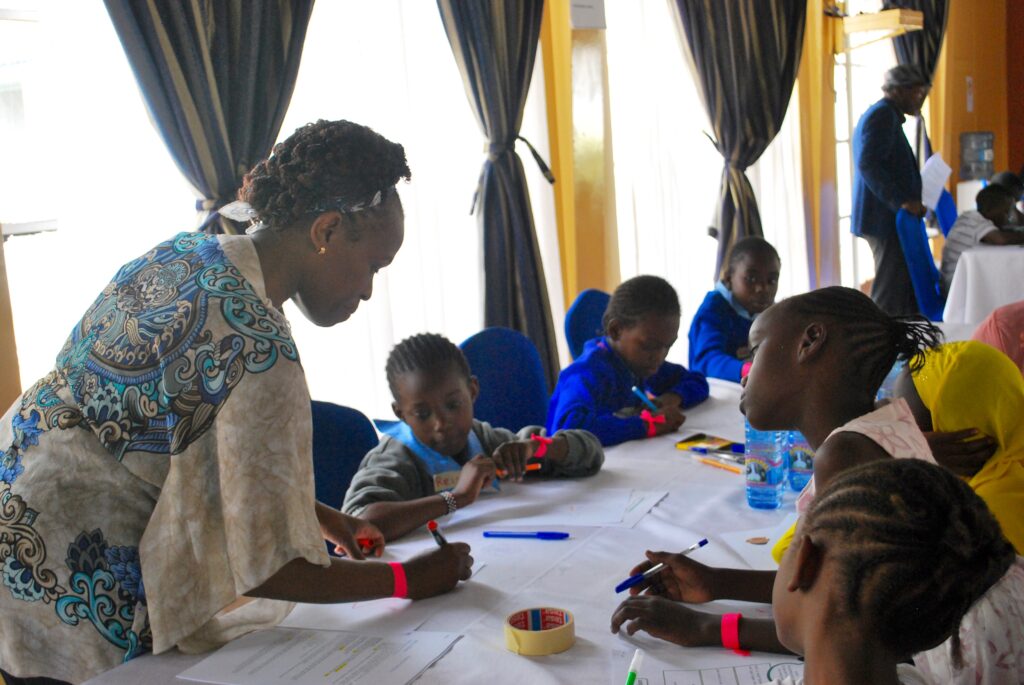Following the calls from our network of educators for the adaptation of the Learning to Live Together (LTLT) Programme to middle childhood years, Arigatou International – Geneva is continuing the two-year process of adaptation of the Programme. The first two pilots in this process took place in Lisbon, Portugal, 8-10 February, and Nairobi, Kenya, 18-23 February.
The pilots involved an exploratory and participatory approach to adjust the content of the LTLT to this age group’s needs. In Lisbon, the pilot involved 30 children from three neighborhoods in the city, and was carried out in cooperation with Movimento de Apostolado de Adolescentes e Crianças – MAAC (Movement of the Apostolate of Children and Adolescents) and the Association Teresa de Jesus. In Kenya, 40 children were welcomed from various different schools in Nairobi, from varying socio-economic backgrounds, and was held in collaboration with UNESCO and the Ministry of Education.
 The pilots themselves explored the concepts of identity, uniqueness, emotions and how to manage negative emotions in a healthy manner, and encouraged children to share and reflect on their roots and connectedness with other beings. Typically, the first day is dedicated to getting to know one another, with games and activities that celebrate uniqueness and appreciate similarities, and introducing to their “friend”: a learning log given to the children for them to privately and safely write down their emotions and feelings. The following days involved activities that address violence in their communities, and problems that children may experience such as bullying, with interactive discussions with the voices of children at the center on how to manage these tough situations and how they can help change their communities for the better.
The pilots themselves explored the concepts of identity, uniqueness, emotions and how to manage negative emotions in a healthy manner, and encouraged children to share and reflect on their roots and connectedness with other beings. Typically, the first day is dedicated to getting to know one another, with games and activities that celebrate uniqueness and appreciate similarities, and introducing to their “friend”: a learning log given to the children for them to privately and safely write down their emotions and feelings. The following days involved activities that address violence in their communities, and problems that children may experience such as bullying, with interactive discussions with the voices of children at the center on how to manage these tough situations and how they can help change their communities for the better.
At the end of the pilot, facilitators held a meeting to reflect on strengths and challenges of the process, and worked on tailoring the Programme further for this age group. In Kenya, a stakeholder meeting was held before the pilot workshop to acquaint the stakeholders with the adaptation of the manual and gather insights to take into consideration for the local implementation of the Programme in the country. The meeting was attended by representatives of UNESCO, UNESCO National Commission, the Ministry of Education, a representative of parent organizations, representatives from the KICD, GNRC members, and religious leaders, and was held at the Kenya Institute for Curriculum Development (KICD).
The inputs of stakeholders provided excellent insights for the implementation of the adaptation, with participants sharing reflections useful to both the local context and relevant to the global implementation, such as suggesting “parent’s involvement, because as much as teachers stay longer with the children, parents influence their children more”.
During the meeting, stakeholders also expressed support and interest in scaling up the implementation of the LTLT in Kenya, describing it as “critical for the wellbeing of the child”, and stating that “LTLT is a game changer in supporting the wellbeing of the child”.
The meeting was then followed by a two-day expert meeting, where the program for the children was planned in collaboration with the facilitators.
In the next months, further pilots will be held in Brazil, Ecuador, El Salvador, India, Indonesia, Lebanon, Romania, and Tanzania. We would like to express our gratitude to those involved in the pilot process in Kenya and Portugal for their support and expertise.
